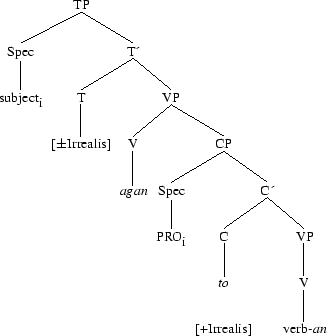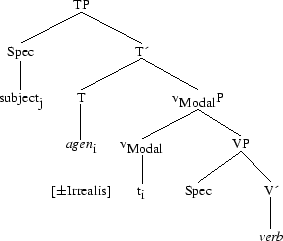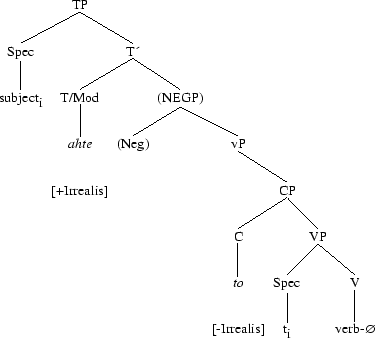
The grammaticalization of the preterite-present verb AGAN
Cet article a fait l“objet d“une communication lors de la 2e Conférence Internationale sur la Modalité ą Pau en 2004 et sera publié dans un volume concernant le temps et la modalité.
Abstract: The aim of this paper is to try and explain, on syntactic and semantic grounds, the grammaticalization of the semi-modal ought to in Old and Middle English (hence OE and ME), i.e. how this lexical item has become a grammatical one(note: ➳).
In OE, agan means ``possess““, but in Contemporary English (CE) it now means ``owe, should““. Agan belongs to the class of preterite-present verbs: broadly speaking, they have a past form, but a present meaning (see Campbell (1959) for further details). The ME form comes from the past form ahte in OE.
In the first section, we shall deal with OE data, mainly focusing on the syntax of agan. In the second section, ME data will be analyzed, making a parallel with the preceding section. Finally, in the third section, we shall focus on grammaticalization, going back and forth the OE and ME periods.
Agan(note: ➳) can be found in different structures:
It can function as a lexical verb and then it takes a DP object,
| Dryhten | hęlend, | žu | že | ahst | doma | geweald. |
| Lord | Christ, | NOM-you | NOM-who | IND.PRES-owns | GEN-justice | ACC-power. |
Lord Christ, who owns the power of justice. (cocynew(note: ➳),86.723. 623)
It can be passivized(note: ➳),
| Ža | cwęš | se | cyningc | to | his | mannum | siššan | Apollonius | agan | węs... |
| Then | PRET-said | the | NOM-king | to | DAT-his | DAT-men | when | NOM-Apollonius | P.PART-had | IND.PRES-was... |
Then the king said to his men when he had had control over Apollonius... (ApolT, ApT:14.1.250)
or it can be an infinitive and follow another preterite-present,
| Ac | se | še | ža | ecan | agan | wille | sošan | gesęlša. |
| But | the | NOM-one | ACC-the | ACC-eternal | obtain | PRES-will | ACC-true | ACC-blessing. |
But who will obtain the eternal true blessing. (comeboe,161.7.23. 52)
It can have the same structure as the auxiliary verb BEON/WESAN ``be““(note: ➳); it is then followed by a past participle,
| ... | se že | ah | lifes | wyn | gebiden | in | burgum. |
| ... | ACC-who | IND.PRES-ought | GEN-life | ACC-gain | P.PART. | in | DAT-town. |
...who ought to ask in town the gain of life. (coexeter,144.27.133)
| hi | agon | on | agenan | hwilan | mid | earfedan | gewunnen. |
| NOM-they | IND.PRES-ought | during | DAT-proper | DAT-time | by | DAT-suffering | P.PART-remained. |
they ought to remain in suffering for their own time. (WHom, WHom_20.2:51.1425)
What is striking concerning this verb is that we have not found examples displaying the structure AGAN + infinitive (which can be found with all the other preterite-presents) in Pintzuk & al. (2000). Meanwhile we did find examples of the structure AGAN + to + infinitive,
| & | betęhte | him | ęl | žęt | he | ahte | TO | bewitenne. |
| & | PRET-delivered | DAT-him | all | that | NOM-he | PRET-ought | TO | DAT-keep. |
& delivered to him all that he ought to keep. (Heptateuch,Gen:39.4. 1564)
At the ME period, it is commonly assume that morphology gets poorer, i.e. a great number of flexions tend to be blurred, or dropped, leaving the words bare. Because of this morphological impoverishment, grammar (and syntax) has to readjust, entailing changes of parameters, hence status of some items.
We now find two forms for AGEN: the present form owe and the past form ahte, both being used either as a lexical or a modal verb.
As a lexical verb, agen can be found as a transitive verb,
| ... | žet | hit | er | ahte. |
| ... | that | OBJ-it | already | PRET-possessed. |
... that (he) already owned it. (CMLAMBX1,31.377)
| ... | the | love | that | men | to | hym | owen. |
| ... | the | love | that | SUBJ-men | to | OBJ-him | PRES-owe. |
... the love that men owe him. (CMCTPARS,313.C2.1087)
As a modal verb, agen is found in two types of structures: modal + infinitive (unlike the OE agan) and modal + to + infinitive(note: ➳)
| ... | žt | euch | mon | ahte | hersumin | & | herien | in | eorše. |
| ... | that | each | SUBJ-one | ought | obey | & | praise | on | earth. |
... that each one ought to obey & praise on earth. (CMKATH,23. 75)
| žus | ahte | ech | of | us | him | seluen | TO | cnowen. |
| thus | ought | each | of | SUBJ-us | him | OBJ-self | TO | know. |
thus, each of us ought to know himself. (CMTRINIT,123.1649)
| [Arthure] | owen | al | že | worlde | TO | deme. |
| [SUBJ-Arthur] | PRES-ought | all | the | OBJ-world | TO | deem. |
Arthur ought to deem all the world. (CMBRUT3,81.2468)
| first, | we | owen | vndirstonde | it | bi | the | lettre. |
| first, | SUBJ-we | ought | understand | OBJ-it | by | the | letter. |
we first ought to understand it word by word. (CMPURVEY,I,52. 2123)
Let us now turn to the syntax of agan/agen in OE and ME. In all the examples we parsed, we found two types of uses : a lexical and a modal use.
In examples (643) to (648), agan is a lexical verb. It is then a V within a vP(note: ➳); in (650), it is a control verb. In Roméro (2005), we have shown that the syntax of the preterite-presents and the syntax of TO in infinitivals were quite similar.
Let us have a look at the following examples, where ∅ indicates an ellipsis of the verb:
| Ure | ęghwylc | sceal | ende | gebidan | worolde | lifes; | se | že | mote | domes | ęr | deaže | ∅. |
| GEN-Us | NOM-every | PRES-must | ACC-end | wait | GEN-world | GEN-life; | NOM-who | that | PRES-has to | GEN-judgment | before | DAT-death | ∅. |
Everyone of us must wait for the end of life of the world, and before death, one has to wait for the judgment. (cobeowul,43. 1386.1148)
| willaž | žęt | gewrecan | gif | we | magon, | žeah | we | beotiaž | TO | ∅. |
| FUT-will | ACC-that | avenge | if | NOM-we | PRES-can, | yet | NOM-we | PRES-pride ourselves | to | ∅. |
(we) will avenge it if we can, yet we pride ourselves on doing it. (BlHom, HomS_10_[BlHom_3]:127.446)
According to those examples (two among many others), the preterite-present verb mote (``must, have to““) and TO seem to have the same behaviour concerning ellipsis. Mote (i.e. a special kind of v) heads a TP, and to (i.e. a C) heads a TP).
But, in that respect, agan does not behave like the other preterite-presents: it is the only one to be structured with TO.
This leads us to question the syntactical status of agan in OE. From examples (643) to (650), agan is a lexical verb. But the structure of (650) is interesting since agan is followed by TO: here we assume it is a control verb, hence the following structure,

We also assume that when agan is followed by a bare infinitive, it has a different grammatical status: it has become a semi-lexical verb (what we called vModal in Roméro (2005)), what example (657) seems to indicate for preterite-present verbs.
So, in OE, we can find agan either as V followed by a TP, or as a control verb when used with TO, i.e. followed by CP. Let us now have a look at ME syntax of agen.
Unlike OE, ME agen can be found both in AGEN + bare infinitive or AGEN + to + infinitive structures, and strikingly enough, we find more examples of OWE(N) + to + infinitive than AHTE + to + infinitive. If we just follow our analysis, agen is a control verb in the structure AGEN + to + infinitive, and semi-lexical in AGEN + bare infinitive(note: ➳).
So (654) and (655) still display control verbs, but not (653) and (656). The changing point lies in (656): in OE agan was not found with bare infinitives, it was only a control verb. We assume this is due to the grammaticalization of agen (and generally speaking of all the preterite-presents class), as well as the reanalysis of TO(note: ➳) (and what Dekeyser calls the "HABERE/DEBERE interface).
Syntactically, we thus have in ME, two competing structures for agen: the ``control““ structure, which is identical with (659), and a ``grammaticalized““ one, which is as follows,

Grammaticalization is the process in which a lexical item becomes a grammatical one. With respect to agen, this is, as Dekeyser (1998) says, a ``braintwister““: in CE, ought does not have a past meaning anymore, but more an irrealis one (a conditional), and it is considered as a ``semi-modal““: grammaticalization seems to have not been completed. And we must add that it always functions with TO, which was reanalyzed because of the loss of the infinitive morphology(note: ➳). Strikingly enough, at the same period, we have not found examples of dare + to + infinitive, nor žurven ``need““ + to + infinitive(note: ➳)
Moreover, we have two forms of agen: present owe(n) and past ahte(note: ➳). In our corpus (Kroch & Taylor (2000)), we have found 20 examples of OWE(N) + to + infinitive, but only 7 with AHTE. Yet, only the latter became a grammatical item. We shall see in the next section that the choice of ahte over owe seem to be due to the meaning of the morphological form(note: ➳). On semantic ground, by the end of the ME period, owe ``own, possess““ is to be used more as a lexical verb, and ahte ``ought, obligation““ as a modal one (see Dekeyser (1998) for more details).
So we have two processes at work for what is to become the modal periphasis ought to: the reanalysis of TO into a TO(Irrealis) (now followed by a bare infinitive) and of AHTE as an irrealis item, with an obligation meaning.
In the following examples, we give illustrations of “past“ forms of modals which have conditional meanings. Some are already grammaticalized (examples (661) and (662)), some on their way to grammaticalization (examples (663) and (664)).
| “Though | I | wiste | that | neither | God | ne | man | ne | sholde | nevere | knowe | it, | yet | wolde | I | have | desdayn | for to | do | synne. |
| ``Though | SUBJ-I | PRES-know | that | neither | SUBJ-God | nor | SUBJ-man | not | should | never | know | OBJ-it, | yet | would | SUBJ-I | have | disdain | to | do | OBJ-sin““. |
“Though I am aware that neither man or God should never know it, yet I would scorn sin.“ (CMCTPARS,290.C2.94)
| The | yeer | of | oure | Lord | 1391, | the | 12 | day | of | March | at | midday, | I | wolde | knowe | the | degre | of | the | sonne. |
| The | SUBJ-year | of | our | Lord | 1391, | the | 12 | day | of | March | at | midday, | SUBJ-I | would | know | the | OBJ-degree | of | the | sun. |
On March 12th in the year of our Lord 1391, I would know the degree of the sun. (CMASTRO,669.C1.189)
| but, | certes, | he | sholde | suffren | it | in | pacience | as | wel | as | he | abideth | the | deeth | of | his | owene | propre | persone. |
| but, | certainly, | SUBJ-he | should | suffer | OBJ-it | in | patience | as | well | as | SUBJ-he | PRES-awaits | the | OBJ-death | of | his | own | proper | person. |
But he should certainly endure it with patience, as well as he awaits his very own death. (CMCTMELI,217.C1b.20)
| for | ase | ofte | ase | ʒe | žrefter | breken | eni | of | ham, | hit | walde | to | swiše | hurten | ower | heorte | ant | maken | ou | swa | offered | žet | ʒe | muhten | sone, | as | God | forbeode, | fallen | i | desesperance... |
| for | as | often | as | SUBJ-you | thereafter | PRES-break | any | of | OBJ-them, | SUBJ-it | would | too | greatly | hurt | your | OBJ-heart | and | make | SUBJ-you | so | P.PART-offered | that | SUBJ-you | might | soon, | as | SUBJ-God | PRET-forbade, | fall | in | despair... |
for, as often as you break any of them this way, it would too greatly hurt your heart and make you so offered that you might soon be desperate, which God forbade... (CMANCRIW,I.46.65)
Let us now turn to agen. The situation is somewhat different: there are more examples with OWE (FOR)TO (morphological present form) than with AHTE TO (morphological past subjunctive form).
| žogh | ʒe | mow | wyth | glosyng | wordys | desayve | me | and | say | ʒe | ben | yn | full | charyte | as | ʒe | owen | FORTO | be, | ... |
| although | SUBJ-you | may | with | glosing | words | deceive | OBJ-me | and | say | SUBJ-you | PRES-are | in | full | charity | as | SUBJ-you | ought | to | be, | ... |
although you may deceive me with glosing words and say you are indulgent as you ought to/should be, ... (CMMIRK,130.3483)
| and | heruth | God | seruyce | as | cristen | men | owen | FORTO | do; |
| and | IMP-hear | God | OBJ-service | as | christian | SUBJ-men | ought | to | do; |
and hear God service as Christian men ought to; (CMMIRK,138. 3674)
| & | [že | eorl] | benam | him | al | šat | he | ahte | TO | hauen. |
| & | [the | SUBJ-earl] | PRET-took | OBJ-him | all | that | SUBJ-he | ought | to | have. |
The earl took from him all that he should have had. (CMPETERB, 58.529)
| When | ye | wyl | aske | any | žing | at | a | ryche | man | in | erthtt, | ye | aske | ful | mekelike | yure | erande | wyd | mekil | mare | deuociun | ahte | ye | žanne | AT | pray | to | god, | of | whaim | žat | al | ʒude | cumis. |
| When | SUBJ-you | will | aske | any | OBJ-thing | to | a | rich | man | on | earth, | SUBJ-you | PRES-ask | full | much | your | OBJ-request | with | lot | more | devotion | ought | SUBJ-you | then | to | pray | to | God, | of | whom | that | all | OBJ-good | PRES-comes. |
When you ask anything to a rich man, you will fully ask your request with much more devotion, should you then pray to God, from whom all good comes. (CMBENRUL,19.667)
When owe is used, TO has been reanalyzed ((665), (666) and (668)), whereas when it is ahte, TO has not yet but the modal has (667).
What does this syntactically mean? The modal is no more generated in V, but in Mod/T: it no more has a past meaning, nor is it a lexical item since it functions as a [+irrealis] head, i.e. a subjunctive, and it weakens so that it cannot move to T anymore(note: ➳). Hence it is no longer a control verb, but a raising one. By the end of the ME period, the syntax of agen would thus be,
[TP [Spec Subjecti [T ahte [(Neg) [TP [T to [VP [Spec ti [V verb]]]]]]]]], that is,

which is different from (659).
With the loss of the infinitive morphology, we showed that the reanalysis of TO went along the one of agen and specially ahte. We also underlined that the meaning shift of ahte, from ``past““ to ``conditional““, or broadly speaking to irrealis, was partly responsible for its grammaticalization. Semantically, agan/agen no longer means ``possess““ but ``obligation““. As for syntax, ought, a control verb in OE, turned into a raising verb generated under T and taking a TO-complement (like ``seem““ or ``appear““) by the end of the ME period.
Yet, dealing with the grammaticalization of such a verb is not that easy since the very process is still obscure, and Contemporary English displays the two ``layers““ of agan: the lexical verb “own/owe“ and the semi-modal ``ought to““(note: ➳). For reasons of space, we did not investigate the root/epistemic interface.